Swimming Santas and a werewolf: Africa's top shotspublished at 03:04 GMT 15 December 2023
A selection of the best photos from the African continent and beyond.
Read MoreThis is an automated feed overnight and at weekends
A selection of the best photos from the African continent and beyond.
Read MoreOn 15 December 2013, South Africa held the funeral of Nelson Mandela who led the struggle in defeating apartheid and became the country’s first black president.
His ancestral home in the village of Qunu in South Africa’s Eastern Cape hosted 60 world leaders including four United States presidents and two UN secretary generals.
It was the first state funeral held by the country.
Nelson Mandela’s eldest child Dr Makaziwe Mandela tells Josephine McDermott how it took eight years to plan and why it makes her proud to remember that day.
(Photo: Candles are lit under a portrait of Nelson Mandela at his funeral service. Credit: Odd Andersen/AFP via Getty Images)
What does it mean to be a gay Christian in a country where many Church leaders say your sexuality is wicked and even demonic? In 2013, a group of LGBT Christians in Kenya started meeting for Sunday worship, to practice their faith free from homophobia. The community grew and became Kenya’s first openly queer-affirming Church - a sanctuary for diverse believers who feel excluded from mainstream religious spaces. But with calls for new laws to further curtail the rights of LGBT Kenyans, and increasingly open homophobia and anti-gay protests, this sanctuary may be in jeopardy. While some members consider returning to the closet, others are determined to protect their sacred space, come what may.
Presenter: Esther Ogola Producer: Mary Goodhart / Esther Ogola Series Producer: Rajeev Gupta Editor: Helen Grady Production Coordinator: Mica Nepomuceno
What does it mean to be a gay Christian in a country where many Church leaders say your sexuality is wicked and even demonic? In 2013, a group of LGBT Christians in Kenya started meeting for Sunday worship, to practice their faith free from homophobia. The community grew and became Kenya’s first openly queer-affirming Church - a sanctuary for diverse believers who feel excluded from mainstream religious spaces. But with calls for new laws to further curtail the rights of LGBT Kenyans, and increasingly open homophobia and anti-gay protests, this sanctuary may be in jeopardy. While some members consider returning to the closet, others are determined to protect their sacred space, come what may.
We'll be back on Friday
That's all from the BBC Africa Live team for now. We'll be back on Friday. In the meantime, you can listen to the BBC Focus on Africa podcast here.
Our African proverb of the day:
Quote MessageA speech without a proverb is like a stew without salt"
An Oromo proverb sent by Dula and Habtamu S Tolla, both in Ethiopia.
Click here to send us your African proverbs.
And we leave you with this photo of people queuing to collect their voter cards in Kinshasa, capital of the Democratic Republic of Congo, ahead of elections next week:
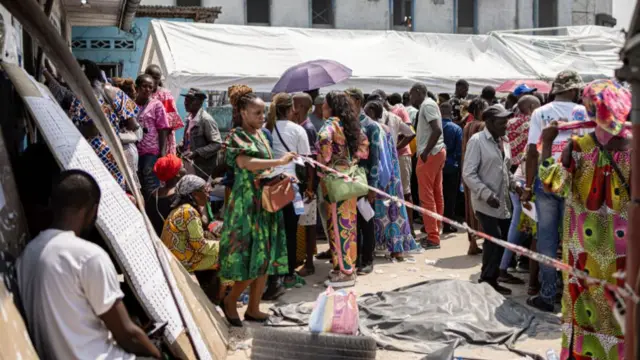 Image source, AFP
Image source, AFPMoses Kollie Garzeawu
Journalist, Monrovia
Liberia's outgoing Finance Minister Samuel Tweh has dismissed as false US allegations that he was involved in "significant" corruption.
The US put him on a sanctions list on 11 December, barring him and his immediate family from entering the country.
Two lawmakers and their families were also placed on the list.
The three men were accused of "abusing their public positions through soliciting, accepting, and offering bribes to manipulate legislative processes and public funding”, the US Treasury said.
Addressing a news conference in the capital Monrovia, Mr Tweh said they had been "summarily accused and rendered guilty without any due process of law".
The decision to sanction them was intended to weaken the outgoing ruling party as it prepares to provide strong opposition to the incoming administration of Joseph Boakai, Mr Tweah added.
He vowed to clear his name, but did not say how.
The government is due to leave office next month when opposition leader Joseph Boakai is sworn in as president.
He defeated Presdent George Weah in elections last month, and has vowed to fight corruption.
 Richard Hamilton
Richard Hamilton
BBC World Service newsroom
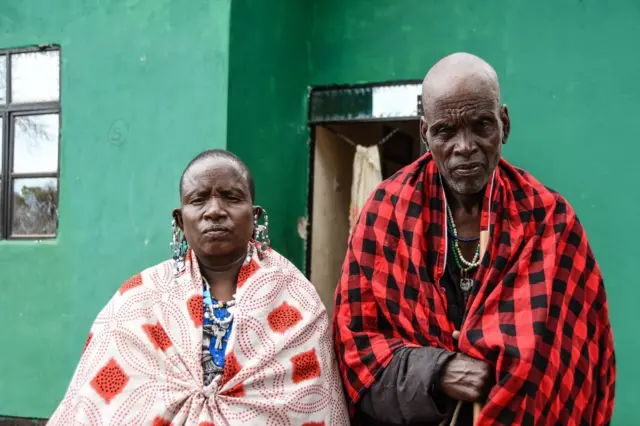 Image source, Getty Images
Image source, Getty ImagesThe government says Maasai families are voluntarily moving away from conservation areas
The European Parliament has condemned the eviction of indigenous Maasai people in Tanzania in the name of conservation.
The resolution comes after attempts by the authorities to evict the Maasai from areas in and around the famous Serengeti national park.
The EU said that indigenous rights were a non-negotiable part of any conservation initiative.
Tanzania's government has denied forcefully evicting the Maasai people, saying they have been moving voluntarily.
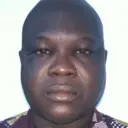 Nichola Mandil
Nichola Mandil
BBC News, Juba
Two men who fled conflict in Sudan have been killed in South Sudan after the vehicle they were travelling in was stopped at gun-point, the UN refugee agency says.
The vehicle was surrounded by armed youths who forced all the people onboard to alight. The gunmen then abducted and killed two men aged 21 and 62, the UNHCR said.
The motive is unclear, but the UN agency said the attack - which took place on Wednesday in central Warrap state - "puts into question our entire strategy" of transporting Sudanese refugees to a newly opened camp in Wedweil in northern Bahr el Ghazal state.
More than 438,000 people have arrived in South Sudan since conflict broke out in Sudan in April between the army and the paramilitary Rapid Support Forces.
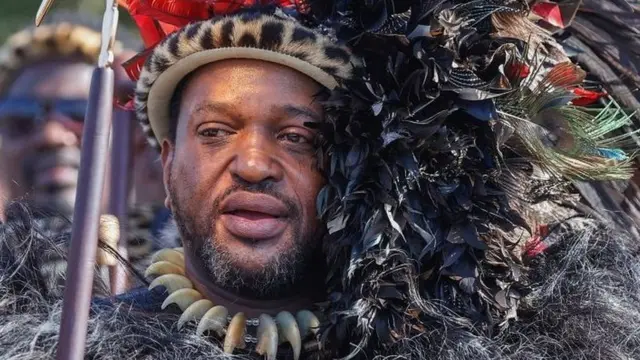 Image source, Getty Images
Image source, Getty ImagesKing Misuzulu ka Zwelithini, 49, was enthroned following the death of his father
South Africa's Zulu King Misuzulu ka Zwelithini has appeared at a government-organised event - just days after a court ruled that his state coronation in 2022 was "unlawful and invalid".
"Nothing is broken. You know your king," he told the crowd, external, at a community event organised by the department of water and sanitation.
King Misuzulu's claim to the throne is being challenged by his elder half-brother, Prince Simakade Zulu, who says he is the rightful heir.
Their father's death in 2021 sparked a bitter family feud over the succession.
President Cyril Ramaphosa recognised King Misuzulu as the king, paving the way for him to acquire the status of a constitutional monarch and to receive government funding.
On Monday, Prince Simakade achieved a major legal victory after a Pretoria High Court ruled that Mr Ramaphosa had failed to properly consider objections to King Misuzulu's accession.
Mr Ramaphosa's office said it would appeal against the ruling.
One of the most-respected members of South Africa's governing African National Congress (ANC), Mavuso Msimang, has withdrawn his resignation from the party - about a week after he quit over what called "endemic" corruption within its ranks.
Mr Msimang's change of mind follows talks with ANC secretary-general Fikile Mbalula, who assured him the party was committed to "renewal, rejuvenation and growth", the party said in a statement.
An ANC member for more than 60 years, Mr Msimang confirmed to TimesLive that he had withdrawn his resignation.
He said he would remain an ordinary member of the party, but would step down as the deputy leader of the ANC Veterans League.
In his resignation letter last week, Mr Msimang wrote that the ANC's "track record of corruption is a cause of great shame".
"The corruption we once decried is now part of our movement’s DNA.
"This has had dire consequences for the most vulnerable members of our society," he wrote in the letter, which was published on the Daily Maverick website, external.
You may also be interested in:
Nkechi Ogbonna
West Africa business journalist, BBC News
Ghana's inflation rate has fallen to its lowest in 19 months, standing at 26.4% in November compared to 35.2% in the previous month, the statistics service has said.
It reached a 22-year high of 54.1% last December.
In May, the International Monetary Fund (IMF) approved a $3bn (£2.4bn) bailout to help the country cope with its worst economic crisis in a generation.
You may be interested in:
Ousmane Sonko's repeated arrests have sparked deadly unrest in one of West Africa's most stable democracies.
Read More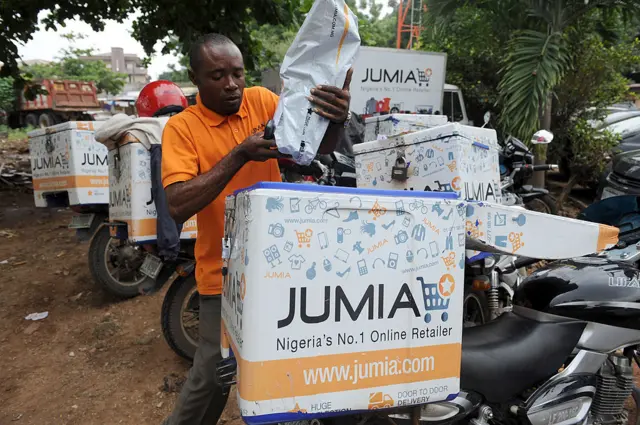 Image source, AFP
Image source, AFPThe company was founded in Nigeria in 2012
Pan-African e-commerce company Jumia has announced that it will end its food delivery service by the end of the year because the business has proved to be unprofitable.
The decision affects all of the seven countries where it provides the service - Nigeria, Kenya, Uganda, Morocco, Tunisia, Algeria and Ivory Coast.
Jumia said in a statement that food delivery was "a business with very challenging economics", and it decided to focus on the physical goods side of the business, where mobile phones are the most ordered item on the company's platform.
Jumia was the first Africa-focused tech firm to list on the New York Stock Exchange in 2019 - about seven years after it was launched in Nigeria by two French entrepreneurs.
A court in Senegal has ordered that jailed opposition leader and presidential aspirant Ousmane Sonko be reinstated on the electoral register.
A government lawyer said it would appeal against the ruling, renewing doubts on whether he will be able to run for president in elections due in February.
He was struck off the electoral roll after being sentenced in June to two years' imprisonment for "morally corrupting" a young person.
The charges stemmed from allegations made by a massage therapist.
He has denied any wrongdoing.
In July, he was charged with insurrection and endangering state security, but is yet to be tried.
He has repeatedly maintained that the cases are politically motivated to prevent him from contesting the election.
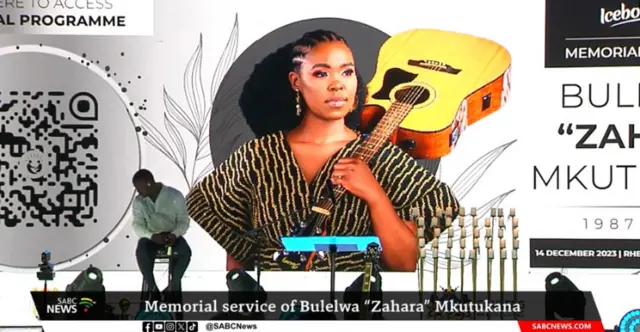 Image source, SABC TV/YouTube
Image source, SABC TV/YouTubeThe Loliwe hitmaker died earlier this week after a short illness
Family, friends and fans of the late South African singer Bulelwa Mkutukana popularly known as Zahara are gathering for her memorial service in Johannesburg.
The award-winning Afro-pop singer died earlier this week after a short illness.
She had been in hospital, reportedly with liver complications.
The family said it did not suspect any foul in the cause of her death.
She will be buried in the Eastern Cape on 23 December.
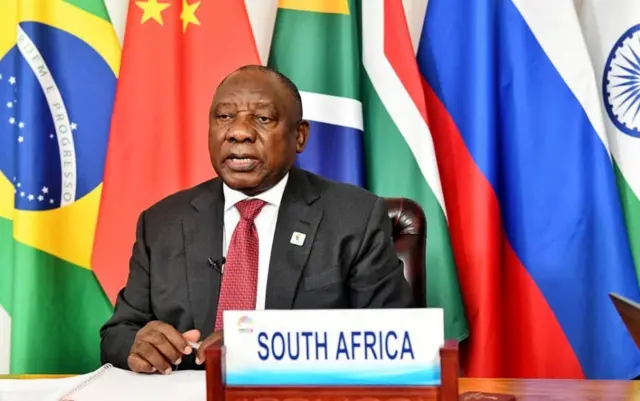 Image source, Getty Images
Image source, Getty ImagesPresident Ramaphosa has condemned antisemitism and Islamophobia
South Africa's President Cyril Ramaphosa has doubled down on the country's support for Palestinians in the ongoing war with Israel, during a meeting with a Jewish lobby group.
In the meeting, South African Jewish Board of Deputies asked President Ramaphosa to protect the community from antisemitism.
They also requested Mr Ramaphosa to restore full diplomatic recognition of Israel, including re-opening the South African embassy in Tel Aviv, and preventing the closure of Israel's embassy in Pretoria, a statement by the president's office said.
They further asked Mr Ramaphosa to "speak and/or act against the boycott of Israeli and Jewish businesses in South Africa".
In response, President Ramaphosa condemned antisemitism and Islamophobia, but doubled down on South Africa's support for Palestinians.
“President Ramaphosa reiterated the South African government position on the current conflict in Israel and Palestine,” the president's office said in a statement.
“The President further emphasised the government’s denunciation of anti-Semitic behaviour towards Jewish people in South Africa, including the boycott of Jewish-owned businesses, and Islamophobia,” it added.
It was initially reported that Joshua Mollel had been taken hostage by Hamas, along with a colleague.
Read More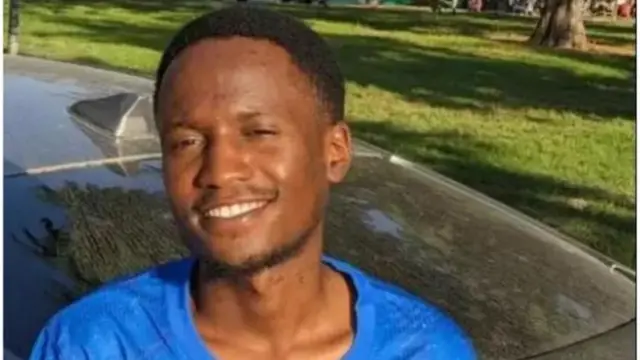 Image source, Kibbutz Nahal Oz/Facebook
Image source, Kibbutz Nahal Oz/FacebookJoshua Mollel's body is reportedly being held by the Hamas group
The second Tanzanian student who has been missing in Israel since October has been confirmed dead, authorities say.
Joshua Mollel travelled to Israel in mid-September as an agricultural intern and had not been seen since 7 October when dozens of residents were massacred in Kibbutz Nahal Oz.
Tanzanian Foreign Affairs Minister January Makamba says Israeli authorities have confirmed that Mr Mollel was killed the day he was taken hostage by Hamas gunmen.
Loitu Mollel, Joshua's father, has been notified about the death of his son, the minister added.
"We are planning to take Mr Mollel, another family member and a government official to Israel to get more information on the matter," Mr Makamba posted on X, formerly Twitter.
In a Facebook post, authorities in Kibbutz Nahal Oz say Mr Mollel's body is being held by Hamas.
The report comes a few weeks after another Tanzanian student, Clemence Felix Mtenga, was buried after he was killed in the 7 October attack.
The two Tanzanians had travelled to Israel as part of a study programme, arriving just one month before the attack.
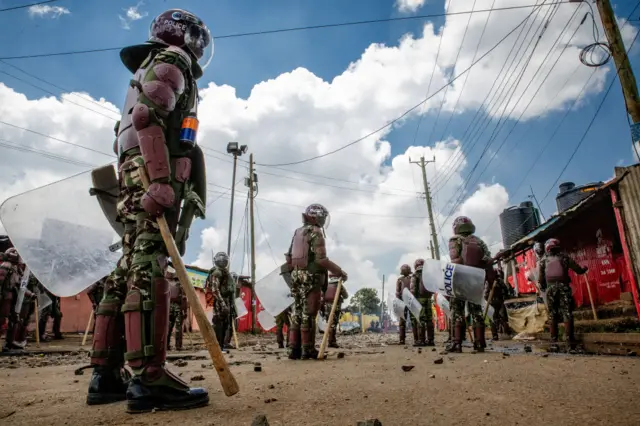 Image source, Getty Images
Image source, Getty ImagesThe first contingent is reportedly scheduled for deployment in February next year
Haitian police chief Frantz Elbe is in Kenya for a three-day visit ahead of plans to deploy police to help fight gang violence in the Caribbean country.
Mr Elbe and his delegation on Wednesday met the Kenyan police chief Japhet Koome and other senior security officials for "bilateral security discussions", the Kenyan National Police Service said.
The visit is part of the preparation for the deployment of the more than 1,000 police officers from Kenya for the controversial Multinational Mission to Support Security (MSS), the UN approved two months ago, Kenyan local media report.
The first contingent of about 300 officers is scheduled for deployment by February next year, according to privately-owned The Star newspaper.
Last month, the Kenyan parliament approved the deployment, but a high court extended orders barring the move, pending the outcome of a legal challenge into the plan.
The plan has faced widespread criticism, mainly due to a poor record of previous interventions in Haiti and a record of rights abuses by Kenyan police.
Kenya's main opposition leader, Raila Odinga, has condemned the proposed deployment. But President William Ruto has defended the plan, saying that "Africa is keen to contribute to the freedom and security of Haiti".
About 300 gangs are active across Haiti and 80% of the capital, Port-au-Prince, is under gang control.
Read more on this story:
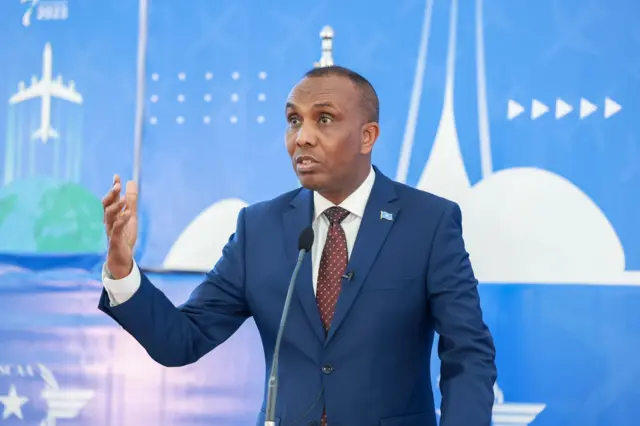 Image source, Somalia Office of the Prime Minister/X
Image source, Somalia Office of the Prime Minister/XPM Hamza Abdi Barre says the relief will enable Somalia to invest in development and revive the economy
Somalia's government on Wednesday held celebrations in the capital, Mogadishu, after the IMF and the World Bank announced $4.5bn ($3.5bn) in debt relief for the country.
Prime Minister Hamza Abdi Barre says that the relief is "equivalent to relieving every Somali person of a debt of more than $300".
"This is a testament that our country and our people are financially viable, attracting foreign investment, and we are no longer debt-ridden,” he adds.
The organisations pardoned Somalia's debt under the Heavily Indebted Poor Countries (HIPC) programme, which was created in 1996 to help poor countries facing an unmanageable debt burden.
The $4.5bn debt relief also includes pardons by other multilateral, bilateral and commercial creditors.
"Somalia’s external debt has fallen from 64% of GDP in 2018 to less than 6 percent of GDP by end 2023," the institutions said in a joint statement.
PM Barre says the relief is monumental as it will allow Somalia to invest in development programs, revitalise the economy and borrow money from international lending institutions.